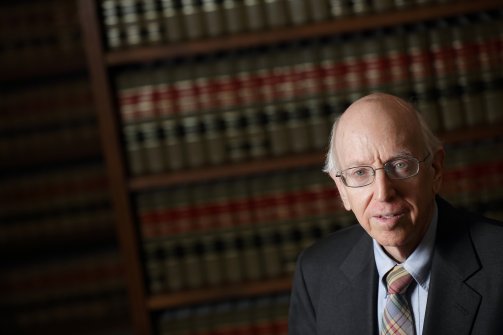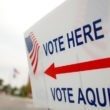(Source: Corbis via Daily Beast)
Federal appeals judge Richard Posner now admits his landmark 2007 ruling that allowed states to require photo ID for voters has damaged democracy. His decision isn’t being used by states to fight fraud. Rather, politicians are using it to suppress voting rights—and boy, he is sooooo very sorry about that.
Posner’s comments have angered the right because while Posner’s original decision set a precedent they loved, the boundaries of that precedent are still being debated in the courts and his new views could influence future rulings.
| If you want to protect your right to vote, your choices are buy a gun or let the world know. |
That’s why Washington Post conservative columnist Charles Lane savaged Posner suggesting that judicial ethics dictate he can’t express opinions—I’d take Lane’s objections more seriously if he had actually raised that objection anytime in the past two decades the judge’s other colorful personal opinions made headlines, like how selling babies might work better than government-regulated adoption, why marijuana should be legalized or Posner’s attack on Justice Scalia last year, in which he shredded Scalia’s book to prove he was a hypocrite. (Scalia response to Posner’s detailed arguments was to scram at a reporter that Posner was a liar.)
Lane also made an even more absurd attack on Posner by claiming that voter photo ID laws were legally sound in part because they have overwhelming support in public opinion polls. So by Lane’s logic, the High Court was wrong in Brown v. Board of Education and Loving v. Virginia because contemporary opinion polls showed equally large majorities in support of racial segregation and miscegenation.
Lane doesn’t even get the polling issue right. Clearly if a pollster simply asks “should a voter be required to produce photo identification” then support has exceeded 80 percent in some cases. However, when pollsters ask questions with more detail, support for “photo voter ID” laws slips to just over 50 percent.
Also, any claims of public support for voter ID laws were dashed in a Minnesota referendum last year that proved when voters hear the whole story, they will oppose photo voter ID. It all began when Republicans controlling the legislature couldn’t pass an ID bill over the Democratic governor’s veto, so they put it on the ballot.
Early polling showed 80 percent of Minnesotans were in favor of adding photo voter ID to the state constitution. But when opponents got enough funding for an education campaign to show examples of how politicians used such laws to define who is actually allowed to vote, support dropped like a rock. On Election Day, nearly 54 percent of Minnesota voters rejected photo-voter ID laws, a 35 percent shift from the early polls.
Which gets us back to why Posner now says his ruling was so terribly wrong: as many have documented, the 2007 ruling has never been used by state politicians to fight fraud. Rather, because our Constitution doesn’t provide our citizens with an actual right to vote, Posner’s ruling allowed politicians to decide who deserves to have a vote.
Not that the politicians aren’t coy about what they are doing: GOP leaders in Pennsylvania and North Carolina openly bragged about how they want to kick Democrats, African-Americans and college students out of the voting booths.
More troubling is Texas: responding in court papers to the Department of Justice’s lawsuit that their election laws were discriminating against minorities, the Republicans controlling Texas admitted they are trying to discriminate but only against Democrats:
“[T]o increase the Republican Party’s electoral prospects at the expense of the Democrats….even if there are incidental effects on minority voters who support Democratic candidates.”
Texas could have added that, for over a 100 years, the Supreme Court has looked the other way when politicians write laws to ensure their reelection.
This stew of voting restrictions includes a North Carolina attempt to overturn a 1979 Supreme Court ruling allowing college students to vote on campus by banning the use of any college ID, even the ones issued to professors and staff. Or Kansas and Arizona, who plan to issue segregated ballots to anyone who used a federal form to register to vote to allow those individuals a vote in federal elections, but not state or local elections.
And Texas takes the cake yet again with a rule requiring exact name matches for photo IDs that will allow the state to charge poll taxes of up to $100 for proper documentation (depending how many forms you need to file) plus an eight week wait before you get your voting documents.
When a Texas judge used a driver’s license that included her maiden name, the restrictive new law forced her to cast a provisional ballot that likely won’t be counted. That case highlighted how officials admit that more than a third of Texas women might not be able to vote right away.
Still, it is not about limiting voting rights: most states have expanded the right to vote for gun owners by allowing hunting licenses and concealed weapons permits.
So if you want to protect your right to vote, your choices are buy a gun or take a cue from Judge Posner and Minnesota and let the world know.
Peter Lindstrom is a political consultant and researcher. He lives in Washington, D.C.





0 Comments